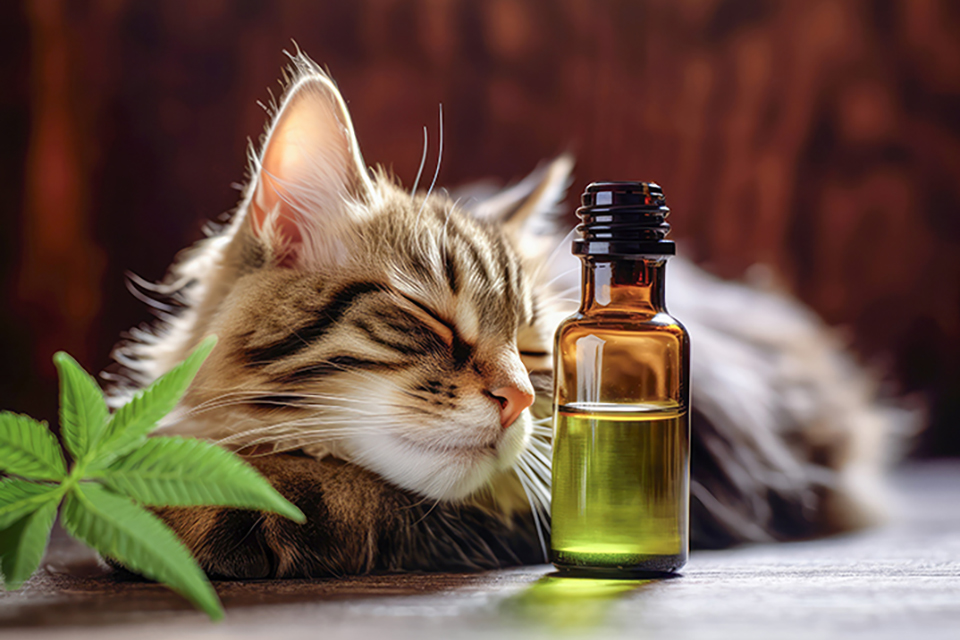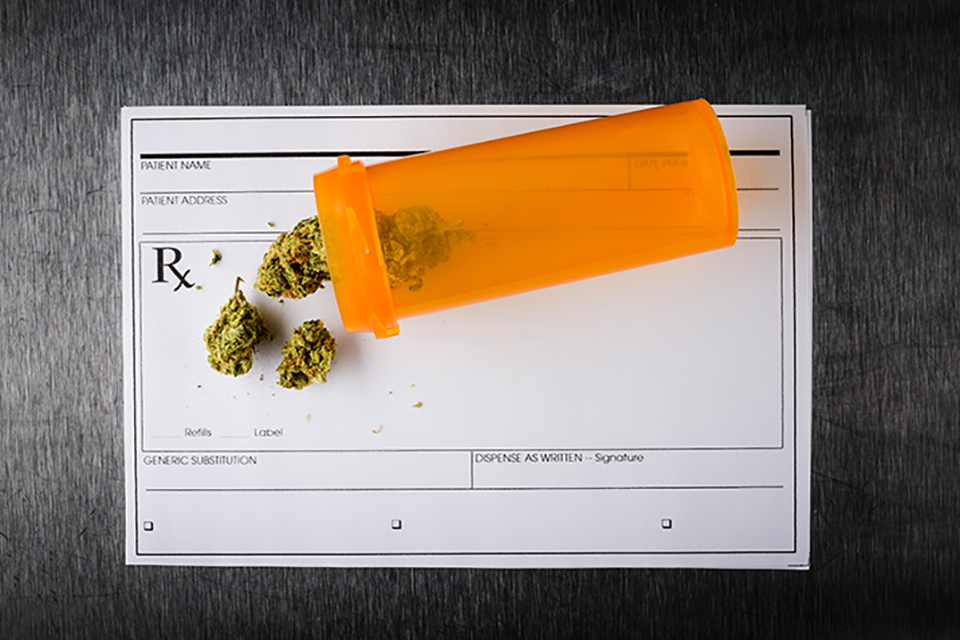
CBD oil has been gaining popularity among cat owners as a potential natural remedy for various health issues. As a cannabis authority, Kind Seed Co recognizes the growing interest in CBD oil for cats and aims to establish itself as a trusted source of information in this field. We believe in promoting responsible use of CBD oil and encourage further research and consultation with veterinarians for the well-being of our feline friends.
What Is CBD Oil and Its Origin?
CBD, or cannabidiol, is one of the many cannabinoids found in cannabis plants. Unlike THC or tetrahydrocannabinol – another well-known cannabinoid – CBD does not have psychoactive properties. It does not produce the “high” typically associated with marijuana use.
While it’s commonly associated with the marijuana plant, CBD oil is primarily extracted from the hemp variety of the cannabis family. This is primarily because hemp contains higher CBD proportions and minimal THC concentrations, thus making it legal in numerous countries.
The extraction process involves removing the CBD from the plant matter and diluting it with a carrier oil such as coconut or hemp seed oil. The result is a potent supplement that can potentially engage the body on a cellular level. With the help of ongoing research, this plant-derived substance is being explored to address various health-related concerns, even for cats.
The Science Behind CBD Oil for Cats: How Does It Work?
Cats have an endocannabinoid system (ECS) – a complex cell-signaling system. Although the ECS plays a vital role in maintaining the balance of bodily functions such as sleep, mood, and appetite, its most consequential function involves the immune response.
The ECS comprises two types of cannabinoid receptors: CB1 and CB2. While CB1 receptors are primarily located in the brain, the CB2 receptors are commonly found in the immune system. Cannabinoids like CBD interact with these receptors to produce their effects.
Unlike THC, which directly interacts with the cannabinoid receptors, CBD influences these receptors indirectly. This is why CBD does not induce the “high” that THC does. When administered, CBD oil stimulates the cat’s body to use more of its naturally produced cannabinoids, helping to create a balance in the ECS.
As it interacts with the ECS, CBD oil can influence how a cat’s body manages pain, inflammation, anxiety, and other physiological and cognitive processes.
Benefits of CBD Oil for Cats
An increasing number of cat owners are turning to CBD oil as a natural remedy for their feline friends. They appreciate the potential benefits this compound may have on their cats’ physical and mental well-being.
Potential Health Benefits
CBD oil’s interaction with the endocannabinoid system may offer a variety of health benefits for cats. Some pet owners report improvements in their cats’ chronic pain, inflammation, and anxiety after using CBD oil. It’s also been used to potentially help manage symptoms of chronic conditions like arthritis and epilepsy.
Veterinarians have noticed that CBD can potentially help reduce nausea and stimulate appetite in cats undergoing treatment for illnesses. This application of CBD oil can be particularly beneficial for senior cats, who often struggle with these issues.
CBD oil may have anticonvulsant properties, helping control seizures in cats. Some cat owners have reported less frequent seizures in their pets when introducing CBD oil into their treatment regimen.
The Importance of Ongoing Research
While these potential benefits seem promising, it’s worth noting that CBD’s effectiveness varies from cat to cat. More significant scientific research is necessary to conclusively establish these benefits. The good news is that ongoing studies continue to explore CBD oil’s potential in veterinary medicine, which will give pet owners and veterinarians a clearer understanding of its benefits in the future.
Potential Side Effects of CBD Oil in Cats
While CBD oil is generally considered safe for cats, pet owners need to be aware of possible side effects. Like any treatment, individual response to CBD oil can vary, and it’s always wise to closely monitor your pet’s behavior and well-being when introducing a new substance into their regimen.
Some cats may experience temporary side effects from CBD oil, which could include sleepiness, changes in appetite, or mild stomach upset. The majority of these side effects are minor and often resolve on their own as your cat’s body adjusts to the new compound.
Consulting a Veterinarian
Before introducing CBD oil to your cat’s routine, you should consult with a knowledgeable veterinarian. A vet who has experience with CBD can provide you with professional guidance, helping you decide if it’s a suitable option and determine the appropriate dosage for your cat. This is particularly crucial for cats with ongoing health conditions or those on other medications.
The introduction of CBD oil into your cat’s life needs to be undertaken with caution and under professional supervision. The well-being of your furry friend should always be the top priority, and Kind Seed Co advocates for thorough consultation and careful use of CBD oil in cats.
Guide to Choosing Quality CBD Oil for Cats
Not all CBD oils are created equal, so it’s essential to select a product that is high-quality, safe, and effective.
Choosing High-Quality CBD Oil
High-quality CBD oil typically originates from organically grown hemp, uses safe extraction methods like CO2 extraction, and undergoes third-party lab testing. These tests verify the actual cannabinoid content and look for possible contaminants like heavy metals or pesticides.
It’s crucial to opt for a CBD oil that’s specifically designed for pets. Human-grade CBD oil may contain ingredients like xylitol, which can potentially be harmful to cats.
Tips for Selecting the Best CBD Oil for Cats
When choosing CBD oil for your cat, look for full or broad-spectrum CBD oil as opposed to a CBD isolate. The former contains a range of other beneficial cannabinoids and terpenes that work synergistically, enhancing the potential benefits of CBD, a phenomenon known as the “entourage effect.”
Next, check the potency of the oil, which is usually listed in milligrams (mg). A higher potency means more CBD per drop, which can be a cost-effective option if your cat requires a higher dose.
Lastly, while flavored CBD oil can be enticing, cats may prefer a natural or catnip-flavored version as opposed to those with artificial flavors.
Preliminary Guidelines on Dosage
The ideal dosage of CBD oil for cats can depend on various factors such as their weight, age, overall health, and the specific ailment you’re targeting. While there’s no universally agreed-upon dosage, many experts suggest starting with a low dose, such as 1 mg of CBD per 10 lbs. of body weight, and gradually increasing it if necessary.
Monitoring your cat closely after administering CBD oil will allow you to determine if the dosage needs adjustment. Look for signs of improvement in their condition, or conversely, keep an eye out for potential side effects.
CBD May Be Beneficial to Your Cat’s Health
CBD oil for cats has the potential to offer significant health benefits. You should consult with a knowledgeable veterinarian before introducing CBD oil into your cat’s routine. Your vet can help you determine the right dosage for your cat and guide you in monitoring the possible effects.
At Kind Seed Co, we are committed to providing reliable information and high-quality CBD products. We advocate for the responsible use of CBD oil and stand as a trusted source of information in this field. Our ultimate goal is to promote the well-being of all pets, and we are here to support you in making informed decisions about your cat’s health.



